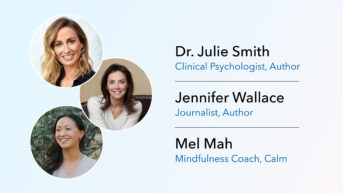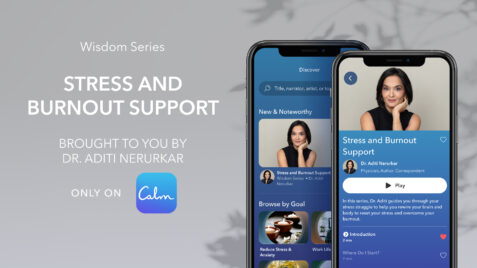Women have twice the lifetime rates of depression and most anxiety disorders, and despite progress to break through shame and stigma, research shows that more work lies ahead.
In fact, according to Gallup’s annual State of the Global Workplace report, both the overall well-being of female managers and their rate of employee engagement fell 7% in 2024, the steepest declines in both categories across all workforce demographics.
In recognition of National Women’s Health Month and Mental Health Awareness Month, Calm brought together renowned psychologist and author Dr. Julie Smith (Dr. Julie) and journalist and New York Times bestselling author Jennifer Wallace for a special discussion about women’s mental health. Moderated by Calm Mindfulness Coach Mel Mah, the webinar was designed to reduce some of the stigma and shame surrounding women’s health and to provide some practical tools women (and men) can use in their everyday lives to improve wellbeing.
Here are some of the key insights shared in Women, Whole Health, and the Workplace: A Mental Health Awareness Month Conversation:
1. Stress is useful, but we need to rest and replenish our resources
Stress is not inherently a bad thing, but instead a useful system that helps us allocate the resources needed to make something happen or get something done, Dr. Julie explained. If we’re thirsty, for example, our stress response kicks in and motivates us to get a drink of water.
But while stress is really useful, it’s supposed to be a short-term measure. After we meet a demand, we return to a state of rest that allows us to replenish our resources and be ready to respond to the next need.
The problem is that we’re not getting that time for reward, rest, and replenishment in our modern, always-on culture. “We’ve lost all the in-between moments that used to be quiet and still and restful,” Dr. Julie said. Instead of using 20 minutes between meetings to replenish and mentally prepare for the next responsibility, we’re checking emails or doing something that we don’t have time to complete. And when we don’t feel we have the resources to get something done—when we don’t get the satisfaction of meeting a demand—we feel the uncomfortable part of stress.
“What you’re doing is just triggering your stress response. ‘Oh, I haven’t done that yet. Oh, I should have done this yesterday,’” said Dr. Julie. “And so we’re just having more and more stress and then not being able to perform at our best either.” She likened this behavior to continuing to take cash out of your bank account and never putting any back in. “You can only do that for so long and then you’re in big, big trouble.
“You’ve got to restore and replenish in lots of different ways,” she emphasized. That could be through sleep, deep relaxation, exercise, eating a good meal, or even socializing and connecting with others.
2. Mattering offers a framework for improving well-being and thriving in life
“The people who thrive in life enjoy this high level of mattering,” said Wallace. Mattering is defined as feeling valued for who we are at our core and having an opportunity to add meaningful value in the world. On the other hand, “a low level of mattering really puts us at risk. When we don’t feel valued for who we are and we don’t have a chance to add value or value goes unnoticed, that’s when we’re set up for struggles.”
With record levels of anxiety, depression, loneliness, substance abuse disorder, and suicide ideation, mattering is crucial, Wallace stressed. “Mattering offers a framework for investigating our own lives, asking ourselves questions, and looking at the people around us, because there are actionable things we can do to unlock our own mattering and to unlock it in the people we care about, either at home or at work or in our neighborhoods.”
Reminding others in your life of the impact that they make—showing them that they matter and appreciating them out loud—can unlock mattering around us. “And what I will tell you is the fastest way to feel like you matter is to remind someone else in your life why they do,” said Wallace.
She also emphasized the need to cultivate mattering at work, not just for the benefit of employees but for caregivers, children, and society at large.
“If we can build up each other’s sense of mattering at work, if we can recognize out loud how much we appreciate a colleague, point out the impact they’re making on the department or the mission of the company . . . what we do is that we send caregivers home so that they could be the first responders to their children’s struggles, because that’s really what we are as parents. We are the first responders day in and day out.”
3. Envy can be inspirational and clarifying
Amid toxic achievement culture, it’s easy to get caught up in what others are doing or having and wish you could do or be the same. And that envy can lead to feelings of being less worthy or not enough.
But envy doesn’t have to lead to a negative place. Rather than block or stop you, envy can inspire you. When you feel envious, take a step back, become aware of how you’re feeling, and consult your own values, Dr. Julie recommends. “You just pull it to arm’s length so that you can see it for what it is.” And if you determine that you truly want what another has, you can “turn that envy into inspiration by looking at exactly how that’s achieved and how you might be able to get there,” she explained. “You can turn that feeling then into a plan of action that is genuinely going to improve your life.”
On the other hand, you might decide that what you’re envious of is misaligned with your personal values—that you don’t truly want that shiny object or experience. “And so you get this real clarity then, where I can feel envy in certain situations, and then I can snap out of it. I realize that’s not the life I want at all . . .It gives you a little bit more self-awareness as to what matters to you.”
“Social media can really elicit a lot of envy,” added Wallace. “We don’t have to judge ourselves for feeling envy, but we do have to hold ourselves accountable for how we act on that envy.” When we look at envy as a source of inspiration, we might even acknowledge another’s achievement aloud and ask them how they got there. “When we do that, we don’t destroy relationships. We actually can unlock somebody mattering.”
4. Resilience rests on the depth and support of our relationships
We’re taught to put on our own oxygen mask first so that we can help others, but research shows that our resilience rests on the support of our relationships, explained Wallace. “For us to stay resilient, we need to have one, two, or three people in our lives who know us intimately, who we can open up to, who are close enough so that when they can hear us gasping for air, they will reach over and put that oxygen mask on.”
What’s more, asking for help gives another the opportunity to feel needed and valued—that they matter to you. “It’s actually an act of generosity,” Wallace added.
Asking for help can be hard, however, whether due to shame or just not knowing where to start.
Pointing to the positive outcomes of a women physicians’ support group studied by the Mayo Clinic, Wallace recommended carving out one hour per week to meet up with a few women you trust. “What we need to do with that hour, the key is being intentional. It’s allowing yourself to open up and being vulnerable, and being with people you trust and who will be vulnerable with you. It needs to be a two-way street. So my biggest takeaway is to prioritize that time.
“We often think as busy parents that it’s selfish to carve out time for us, but if you will not do it for yourself, do it for your kids, because their resilience is rooted in your resilience, and your resilience is rooted in the depth of those relationships.”
Dr. Julie recommended building trust with others slowly over time but when you know you need help, be concrete in your ask and ask quickly—before you talk yourself out of it. “And then what you’ll notice is their face lights up that you even asked.”
For more insights and practical tools you can apply, watch the full webinar on demand and check out related blogs:




